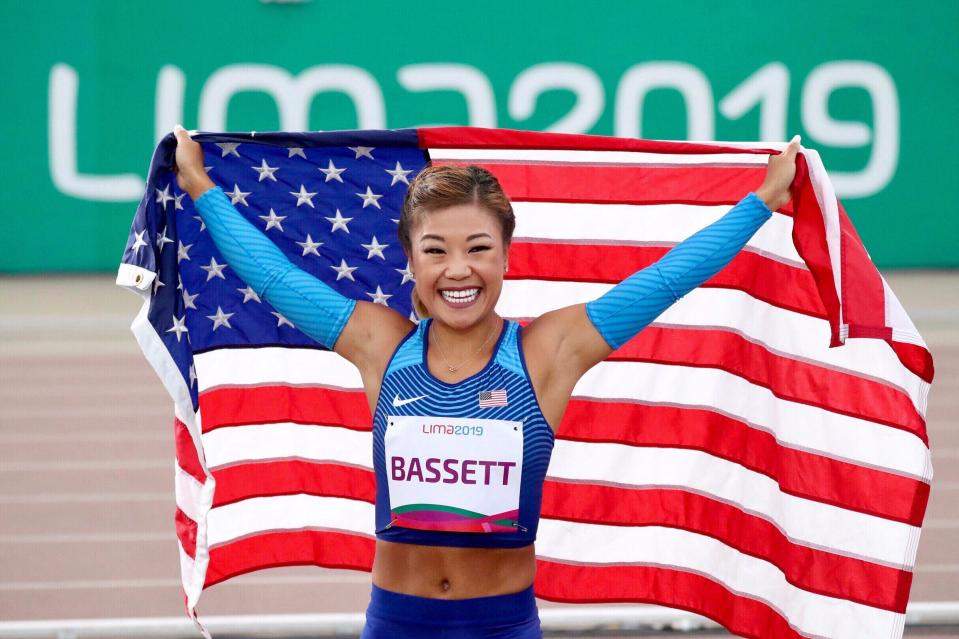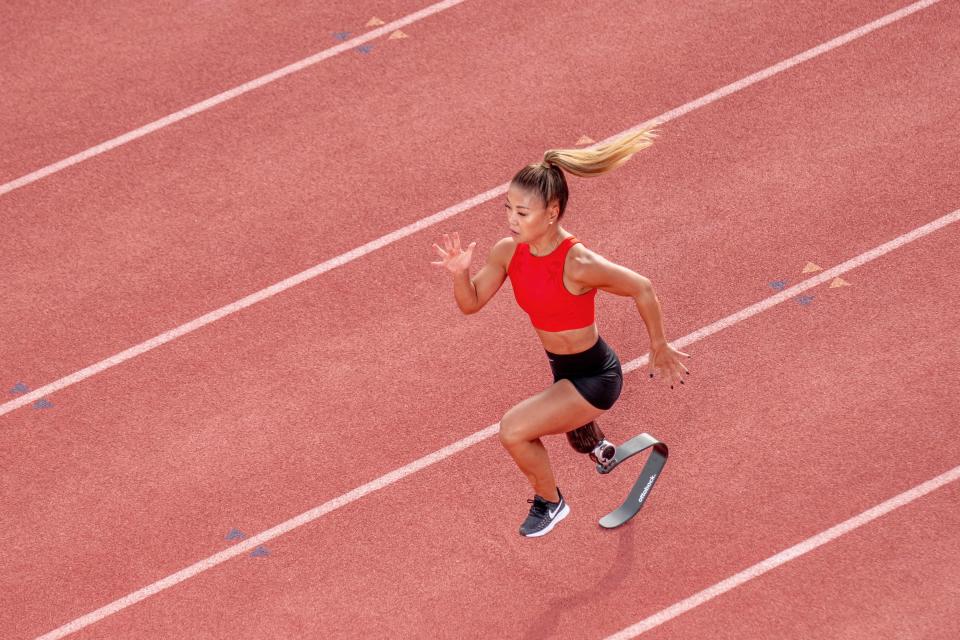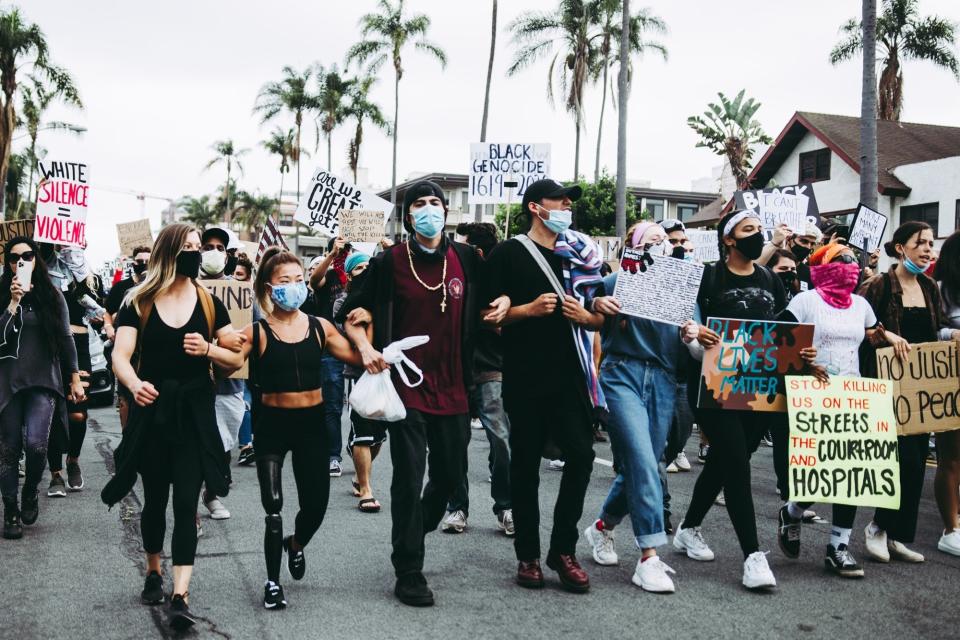Paralympian Scout Bassett Won’t Be Tokenized
A quick glance at Scout Bassett’s Instagram page and you get the basic facts about her: She is a professional runner, loves the beach, and has great hair. In most photos her prosthetic leg is front and center.
She wasn’t always so comfortable with the carbon fiber blade that helped power her to spots in the World Championships and 2016 Paralympic Games. In fact, she hated her first race. “I remember having the meltdown of all meltdowns—like the ugliest meltdown that a girl can have,” Basset says. “I got that feeling of a panic attack, like I’m going to die doing this.”
She was 14 and had never really run before, but that wasn’t what had her so freaked out—she was upset that people were going to see her prosthetic leg. “I had always worn a cosmetic cover over my everyday walking leg; it didn’t look anything like my other leg so I don’t even know who I thought I was fooling,” she says. “But there was shame and this reluctance to really embrace that part of who I am because it was always the thing that separated me and made me feel so different and excluded from my peers.”
A running blade cannot be disguised. Obsidian black, sleek, and pulsating with potential energy, it invites attention. It makes a 14-year-old girl different. Special. “I just was looking at this thing and feeling out there and totally exposed,” Bassett says. “It was really a fear of having to be seen.”
Bassett spent the first seven years of her life in an orphanage in Nanjing, China. As an infant, she was found on the street after losing her right leg in a chemical fire. “I was able to go back in 2016 to face the place and the people that had broken me and say that I’m okay. I’ve made it,” she says.
That first terrifying race (which came after she started working with the Challenged Athlete Foundation) helped her get there. “It lifted the chains of all the things that had held me down as a young girl. All the no’s that I had heard in my life—when I ran, I didn’t feel that. And I didn’t feel that I was disabled. I forgot about all the things that make me different,” Bassett says. “I realized at the end of that race I’m never going to be ashamed of being an amputee, of what happened to me, or of my story. And that was such a powerful thing to happen at 14.”
Bassett was adopted by a couple from the United States and spent most of her childhood in a small town in northern Michigan. “I grew up in a community where I was the only person with a disability and I was the only nonwhite girl,” she says. “You realize you’re very alone. In some ways because of how people treat you, you think you’re this total monster, you know?”
“Our society cannot change the way we see people with disabilities and cannot create greater opportunities for them if we have this collective discomfort.”
When we talk about the importance of representation, this is it. Bassett had no role models—no Michael Jordan of the Paralympics, no athletes with disabilities showing off their hardware on social media, no community. “I had never been in an environment with other people with disabilities,” she says of her early races. “I saw girls that were missing one and two legs, who were missing arms. I had never seen anyone like that doing a sport before. And they were doing it so well and so fast—it seemed so effortless for them. That was the start of the idea that I could be an athlete like these other girls.”
Since she started running, Bassett has competed in three World Championships, brought home two bronze medals ( long jump and 100-meter dash), and made it to her first Paralympic Games in Rio in 2016. She is the fastest woman of her classification to ever run the 100-meter dash for the U.S.

For so many athletes, the cost of sports greatness comes at the price of a total laser focus on that elusive moment on the podium. Bassett has her eyes firmly fixed on bringing home a gold in the 2020 Paralympic Games to be held in Tokyo next year, but the medals and records aren’t the point for her. Her goal lies beyond the track, fueled by a drive to make women with disabilities more visible.
“One thing that happens to me all the time when I’m at the grocery store or at Target is a little kid sees me, and he might start screaming to his mom—like ‘Mommy, look at her leg! She’s a robot!’ They’re screaming to their mom for attention like, “Explain this to me!’ And I would say over 99% of the time the parent silences the kid and tries to hush them up and say, ‘Don’t point. Don't ask,’” Bassett says. “Stop trying to get them to be quiet about it. I understand the intention of the parent is good, but the problem is that it makes the child think that there’s something wrong with it and that there’s a reason to be fearful. That’s why visibility and representation matters. Our society cannot change the way we see people with disabilities and cannot create greater opportunities for them if we have this collective discomfort.”
“I don't want people to watch the Paralympics because it’s the right thing to do. I want people to watch because of how incredible these athletes are.”
In 2019, Bassett appeared in ESPN’s annual Body Issue, bearing her running blade and her scars. When she was first approached with the idea, her response was “No. Not in a million years,” she says. “It really didn’t have anything to deal with being a nude aspect. I have burns from my waist down that I haven’t exposed to the world, and I haven’t always embraced that about my body.” The idea of helping to promote greater visibility eventually changed her mind. “Sometimes we have to put aside our own fears and be willing to take the lead and to be bold and courageous,” she says. “Not just for ourselves but for somebody else.”
Media coverage that promotes visibility is becoming more common, but massive strides still need to be made. The Paralympic games is one of the largest sporting events in the world—but it’s not covered like that. “I want the Paralympics to matter. It’s a great opportunity to have the world, in particular this country, see people with disabilities in such a different light,” Bassett says. “When I see the amount of coverage that we receive in this country compared with the Olympics or that of able-bodied athletes, it’s really a disgrace to me.”
Sports coverage shouldn’t be more diverse just for diversity’s sake—it should be more diverse because watching athletes with different backgrounds and stories is simply better. “I don’t want people to watch the Paralympics because it’s the right thing to do. I want people to celebrate and to watch because of how incredible and powerful these athletes are,” Bassett says. “I would challenge anyone to come spend the day in my shoes, to see my training routine, and tell me if they could do it as easily.”

Ahead of the Tokyo Olympics, Bassett is learning to train with a different type of prosthetic leg, which has a knee joint. “I have fallen multiple times,” she says with a laugh. “I’m like, I just don't know how many able-bodied athletes would be willing to do this”—you know, learn to run all over again just a year before the most important race of their career—“and suffer and fall this many times and say, ‘I’m still going to keep going. I’m still dedicated to this.’”
When athletes with disabilities are covered in mainstream media, they’re often tokenized. “A lot of the responses [to calls for greater coverage] are like, ‘Well, you should just be happy that you’re even being included.’ Well, that’s not enough for me,” Bassett says. “Having a seat at the table is important, but if you’'re not valuing my seat at the table and you’re just using me as a way to check a box, you’re not creating change.”
As a woman with a disability, Bassett has to fight even harder for that seat. The opportunities available to female athletes are disgracefully sub-par—they receive fewer sponsorship dollars, inferior training conditions, and only 4% of all sports media coverage.
The Tokyo games will mark the first time Paralympians will be offered the same prize money as Olympic athletes, which is “a tremendous move towards equality,” Bassett says. “But here’s the problem: Women have fewer opportunities to win that medal than men do because there are fewer sports for women, and within those sports there are fewer events for women.” In the 2016 Games, only 38% of the athletes were women, and they competed in 38 fewer events, according to the Women’s Sports Foundation. (Women athletes will make up nearly half of all competitors at the Olympic Games in Tokyo, according to the International Olympic Committee.) “It’s great that Paralympic athletes are getting paid the same amount as Olympians for winning a medal,” Bassett says. “But if you have fewer opportunities to do so than a man, is that really equality?”
Part of the problem is lower participation in sports—girls drop out of sports at two times the rate of boys largely due to factors like social stigma and lack of access. It’s a catch-22. “How do you get girls to participate when you don’t offer the opportunity?” Bassett says. For girls with disabilities, the stigma is more powerful. “You already stand out because you’re different, and then you’re putting on a piece of equipment that makes you stand out even more,” Bassett says. “I think it’s really hard for young girls to get over that hurdle.” For Bassett, it’s all the more motivation to put herself out there to create more opportunities for girls like her. “I think a lot about my journey. I could never have dreamed that as an orphan in a situation of such despair and trauma, I would ever be where I am today and have the opportunities that I have now,” she says. “Sport has transformed me. And I really want part of my legacy to be that no one is denied the opportunity to be involved in sport because of a disability.”
“If you’re not valuing my seat at the table and you’re just using me as a way to check a box, you're not creating change.”
For all her accomplishments on the track, Scout Bassett is best described as a champion for visibility in all things, not just sports. “I know most people know me as an athlete, but I want to be known as so much more than that,” she says. “I don’t want to just be somebody that just posts about it or talks about it, but is actually doing something about it.” In June she joined a Black Lives Matter march in San Diego—a type of activism that’s complicated for a woman with a prosthetic leg. With her walking prosthetic, Basset can typically do about three miles of walking in a day. The march was eight miles, but it was important for her to show up in that way. “I learned that a third to half of the people who have been killed by police have a disability,” she says. “There’s more to learn from that and what that means. I hope we can shine a light on the importance of visibility.”

At the protest Bassett was surrounded by people all willing to fight that fight. “Most people there weren’t minorities, but they were all really passionate about why they were there,” she says. “That just gave me so much hope for the future.”
Macaela MacKenzie is a senior editor at Glamour covering wellness and women’s equality in sports. Follow her on Instagram at @MacaelaMac and Twitter @MacaelaMack.
Originally Appeared on Glamour

